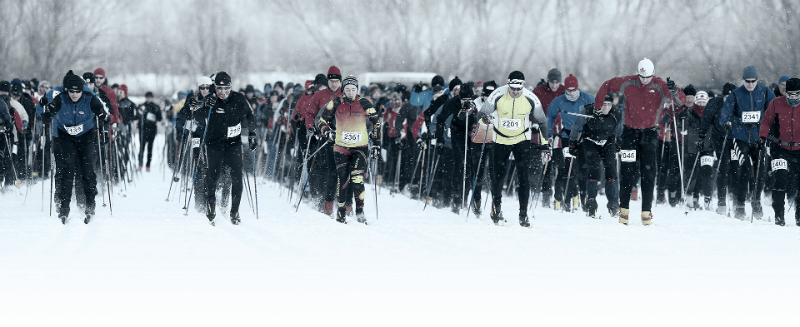
(canadianbirkie.com)
In my last blog, I showcased some strength exercise ideas in preparation for skiing the Birkebeiner. Two months and no snow later (saved for the last few days), most of us skiers have resorted to either running or other means of exercise to prepare for the annual loppet in less than 2 weeks. However, nothing can prepare for the demands of Nordic skiing like Nordic skiing itself. With so little skiing and with less than 2 weeks before the race, what should we do with the Birkie?
There are of course only 3 options: ski the race as planned, drop out and head to Maui instead, or ski the race but with adjusted expectations. Even though Maui sounds nice, let’s speak about the third option.
Goal setting is a wonderful thing. Two months ago, my End Goal was to ski faster in this year’s Birkie than last year. With this in my mind, I created Process Goals: Scheduled gym days, running days and ski days. At the end of the day, I just wanted to be more prepared and fitter than I was last year. However, life and weather have not cooperated and my preparation this year has been no better than last.
For my patients, being in rehab with an injury is certainly not part of their Process Goals. Like poor weather, it’s an unwelcome set back and every second spent not working towards their End Goal is stressful.
In 2017, I had a total of 3 patients who wanted an assessment to PREVENT an injury. Two were runners who wanted a strength program at the start of their training program to improve their running performance and for injury prevention months before their scheduled race. The third was a person who wanted to improve her walking efficiency and endurance in preparation for a trip to the cobblestones of Europe. None of them were injured or in pain. I have a name for these types of patients. I call them Wonderful. They are certainly a rarity. They are people with incredible foresight and meeting them makes my day. I saw them once for the initial assessment and then once more weeks later to progress their program. One of the runners emailed me months later to tell me that his strength program helped him to be far fitter and stronger and injury-free. It was the best build up he has had for a race and his marathon race time was his personal best. Of course, not all prevention programs will guarantee such success. But having a plan to identify and to address your weaknesses is an important part of every person’s Process Goals if one is to be successful in reaching your End Goals. This applies to not just sports but in business, academics and in so many areas of life itself.
In life, despite our best efforts, setbacks and unwelcome surprises do happen. When they do, here are a few principles to help you achieve your goals or at least create new ones.
- Process Goals are vital to helping you achieve your End Goal. When setbacks happen, keep focused on the process and celebrate each milestone that keeps you moving towards your end goal. Healing from an injury does not happen overnight but happen in stages. Work hard within each stage and be grateful for your improvements rather than lamenting the fact that “you’re still not there yet.”
- Seek good advice from your trusted health care professional. Get assessed early in the process to prevent injuries. Ask yourself: Do you have the right equipment for your sport or activity? Do you have sufficient fitness (strength, endurance, flexibility) to achieve your goals? Have you scheduled sufficient time to achieve your goals. If not, what adjustments do you need to make?
- Injuries are a part of life. When they do happen, start rehab early! Rest alone hardly resolves problems. One study reported in the New England Journal of Medicine in September 28, 2017 found that for acute muscle injuries, starting rehabilitation 2 days after injury compared to 9 days shortened the interval from injury to pain-free recovery and return to sports by 3 weeks without any significant increase in the risk of re-injury.
- When setbacks do happen, adjust your expectations and end goal accordingly. Wisdom in knowing when to push and when to back off comes from practice and experience. If you are new to the activity or sport and if your preparations have been greatly curtailed, then it may be wise to reconsider your goals and adjust accordingly. This is where your relationship with your trusted health care practitioner will help.
Weather permitting, I will ski the Birkie in 10 days but with reduced expectations. Sometimes it’s best to ignore your race results, keep your watch at home, and just ski for the sheer fun of it.
References:
Magnusson et al. Early versus Delayed Rehabilitation After Acute Muscle Injury. N Engl J Med 2017; 377:1300-1301
Submitted by Albert Chan
